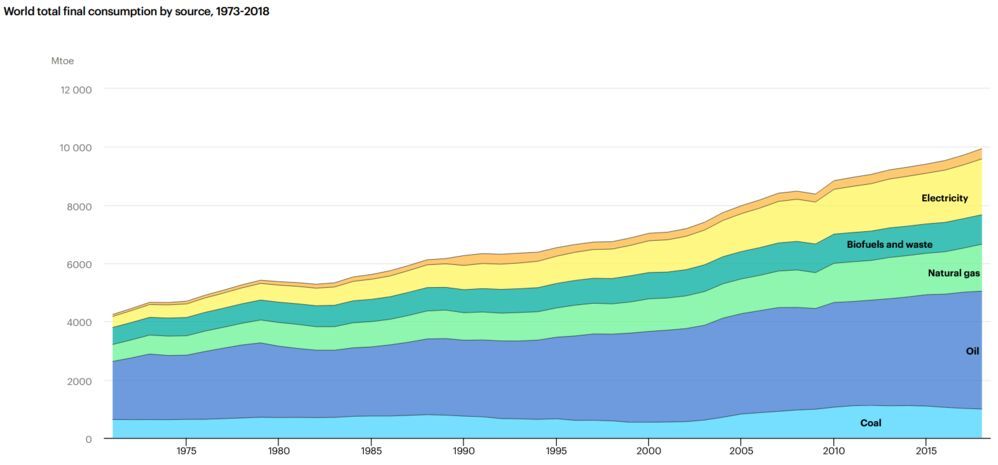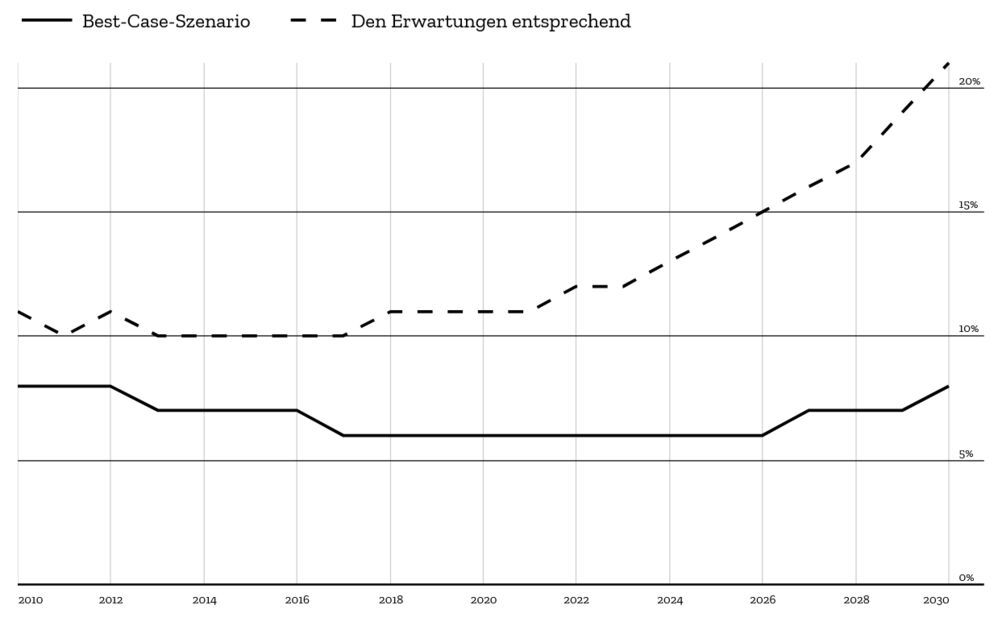The beginnings of the Internet date back to the 1960s. With its development, the application possibilities multiplied, but so has the number of users. More and more users around the world are spending more and more time on the internet. With the introduction of the smartphone, large parts of the (global) population are permanently online. In addition to social, political and ethical issues, we would also like to discuss the effects of this situation on the environment, or more precisely on energy demand, in our blog.
Empirical Evidence: Global Energy Demand

Global energy demand is rising continuously. To make this clear, we need to get into the scientific data. Global energy consumption is usually measured in oil units, even though it may be a different form of energy. This is why an oil unit is often referred to as an oil equivalent. One oil unit is equal to the amount released when one kilogram of petroleum is burned. [1, 2]
Although energy consumption has changed little since 2000 due to very high baseline levels and technological progress in Western OECD countries, a sharp increase is evident in Asia, particularly China. While about 7,000 megatons of oil equivalent (Mtoe) were consumed in 2000, global consumption today is over 10,000 Mtoe. To put this into perspective, one Mtoe is equivalent to 11.63 terawatt hours (TWh) or 11.63 trillion watt hours, i.e., the average energy demand of nearly 750,000 German households within one year. [1, 2, 3]
During the same period, CO2 emissions from energy consumption actually more than doubled from 10.5 gigatons (Gt) to about 22 Gt. The discrepancy between the increase in energy consumption and the much larger increase in CO2 emissions is due to the differences in CO2 emissions depending on the energy source. For example, coal energy production is more CO2 intensive than gas. [4]
The Energy Demand of the Internet

With the expansion and spread of the internet, this sector is now also contributing significantly to the rising energy demand. Servers and data centers already emit as much CO2 as global air traffic. The internet already accounts for more than 10 percent of energy consumption. Depending on the estimate, this share remains relatively stable at around 10 percent in more optimistic scenarios, with the most likely forecasts predicting an increase to around 20 percent this decade. Thus, information and communications technology (ICT) is likely to generate more CO2 emissions than any country on earth, apart from China, India and the U.S., as early as 2025. [5, 6]
In addition, the end devices of an ever-growing number of end users, such as computers, smartphones or IoT devices, must be taken into account, but much more importantly the massive data centers that are used to operate and network these devices. If these end-user devices are included in the estimate, the share could even be over 50 percent of global energy demand by the end of the decade. [7, 8]
Energy on the internet is not only required by the permanent operation of data centers, but also for their cooling in particular. Complex cooling systems now account for about 40 percent of data center energy consumption. The digitization pressure from the ongoing pandemic is arguably also making its own contribution to the rise in CO2 emissions from the network. To be sure, digitization is also saving CO2 in other places where analog processes, such as travel, were necessary. Nevertheless, the increasing share of ICT in global energy consumption offers a significant cause for sustainable reform, not to mention the rising e-waste, which, however, should not be the topic at hand. [6, 9, 10]
The role of global technology corporations

In order to make the energy for global communication sustainable across the board, the major global players, such as companies and states, have a particular responsibility. This responsibility arises not only from moral considerations, but also from economic, ecological and health arguments. It seems clear that as a society, as states, and as humanity as a whole, we can no longer ignore the ever-increasing negative effect of our technology on the environment. In economics, we speak of externalities or external effects in this context. Externalities are uncompensated effects of economic decisions on uninvolved parties, i.e. effects for which no one pays or receives compensation. Specifically, this means that often the costs of negative effects on the environment do not have to be covered by the institutions that cause them. [7]
Problematic in this context is the phenomenon of so-called greenwashing. Greenwashing is the technical term for public relations work that aims to give a company a green and sustainable image in public, although there is objectively no basis for this. Thus, it is misleading marketing. Greenwashing can take many forms in order to make consumers believe that the services and/or products are environmentally friendly. In particular, framing, distraction, inaccuracies and lack of transparency are popular means. [11]
In 2017, the international environmental organization Greenpeace, which is regarded as independent, published a ranking of individual corporations in terms of their energy sustainability. The “Company Score” was formed on the basis of various criteria, such as transparency, commitment to the use of renewable energies, energy efficiency, the use of renewable energies, and advocacy for the use of renewable energies. This reveals a very diverse picture of global companies. While Apple, Facebook and Google achieved the best scores of the corporations surveyed, the scores of Microsoft, Amazon, Spotify, Baidu and Alibaba are not quite as good to critical to interpret. It is important to note that this is not a ranking of sustainability overall, but mainly sustainability in the selection of energy sources, for example, not the sustainability of physical products or other corporate practices. [6, 9, 12]
However, the goal of corporations to use primarily or entirely green energy also emerged only as a result of public pressure. While this aspect had no place in the respective corporate policies in the late 2000s, it gained greater public attention in the intervening period, and thus economic and image-related incentives for companies, in addition to general awareness and sensitization to the issue. Nevertheless, a rapid, truly sustainable corporate policy is probably not possible without government-set standards and political will. [13]
Individual Recommendations for Action

In this section, we would like to provide you with individual recommendations for action to reduce your energy consumption on the Internet and support the transition to sustainable energy sources in everyday life. This is explicitly about online behavior and not about comparing the energy consumption of different hardware and end devices. [14, 15]
1. Use of sustainable services
Using energy sustainable services requires exposure to the topic and information. Inform yourself regularly and adapt your daily usage behavior to this information if possible. For most services there are sustainable, environmentally friendly alternatives, i.e. if you are using a music streaming service, for example, which obviously hardly uses renewable energies, you can switch to a more sustainable service.
2. Delete unnecessary content
All files and information require storage capacity in large data centers, some of which fuel the enormous energy demands of the internet. Especially if online storage media are used, it can therefore be advantageous to regularly delete superfluous files. This also applies to e-mails, by the way. A study by Lancaster University estimates the average CO2 emissions from a single e-mail to be 4g CO2. According to this estimate, “typical” business people consume about 135kg of CO2 per year just from e-mails, which in turn corresponds to a distance of over 300km traveled by car. It should be taken into account that a large part of this energy is consumed in the process of sending and receiving e-mails, but archiving and retrieving large amounts of data also consumes a not inconsiderable amount of energy. By the way, it makes a serious difference whether memory-intensive attachments are added to an e-mail or not. Of course, the same also applies to cloud storage.
3. TV instead of streaming, local instead of online
Of course, our recommended approach is not to stay away from all streaming, but to create awareness and educate on the topic. After all, it makes a difference whether you watch a program live on TV or stream it in a media library. With comparable end devices, the live TV program is less energy-intensive than streaming. The same applies to other forms of streaming, such as music.
4. Switch off autoplay functions
Surely we have all experienced this more than once. You stream a movie or video in the evening and fall asleep. To avoid unnecessary energy consumption of the stream, the autoplay function of video or audio streams should therefore be deactivated if possible.
5. Reduce resolution
To minimize the amount of data transferred and thus the energy consumption, the resolution can be reduced. You usually want to watch good movies and series in the best possible quality. As an everyday tip, you should therefore at least make sure to lower the resolution of streams that you tend to run in the background or on the side, and deactivate the video stream if possible. The stream quality should also be adapted to the respective end device. For example, it does not always have to be the highest possible resolution on small screens, such as a smartphone.
Green Energy & ViOffice
ViOffice is not a self purpose for us, but we see it as an entrepreneurial project oriented towards sustainable, ethical and socially just future viability. We weigh any operational activities according to these basic principles. We are aware that the software and IT sector in particular is a driving factor in the increasing demand for energy in the global North.
Thus, we rely on sustainable energy sources for our digital infrastructure, i.e. our servers have been powered exclusively by renewable energy since our founding. We have explicitly chosen data centers and server hardware that have been assessed and certified to be highly energy efficient and that are powered exclusively by electricity generated from wind, hydroelectric or solar energy. In addition, we pay attention to efficient server utilization in order to save costs and to use energy optimally.
Sources
- International Energy Agency (2020): Key World Energy Statistics 2020. Online at: https://www.iea.org/reports/key-world-energy-statistics-2020/final-consumption [01.08.2020].
- Parrisius, Anna (2019): Was unser Digitalkonsum an Energie kostet. Online at: https://www.tagesspiegel.de/wirtschaft/stromfresser-internet-wie-viel-strom-wir-im-einzelnen-verbrauchen/25182828-2.html [06.11.2019].
- Umweltbundesamt (2020): Energieverbrauch privater Haushalte. Online at: https://www.umweltbundesamt.de/daten/private-haushalte-konsum/wohnen/energieverbrauch-privater-haushalte#endenergieverbrauch-der-privaten-haushalte [01.07.2020].
- International Energy Agency (2020): Global CO2 emissions in 2019. Online at: https://www.iea.org/articles/global-co2-emissions-in-2019 [11.02.2020].
- Andrea, Anders (2017): Total Consumer Power Consumption Forecast. Online at: https://www.researchgate.net/publication/320225452_Total_Consumer_Power_Consumption_Forecast [01.10.2017].
- Mozilla (2018): Internet Health Report 2018. Online at: https://internethealthreport.org/2018/the-internet-uses-more-electricity-than/ [01.04.2018].
- Oghia, Michael (2017): Sustainability is Good for the Internet (and Business too). Online at: https://labs.ripe.net/author/michael_oghia/sustainability-is-good-for-the-internet-and-business-too/ [23.06.2017].
- Andrae, Anders; Edler, Tomas. (2015): On Global Electricity Usage of Communication Technology: Trends to 2030. In Challenges 6, No. 1: 117-157. Online at https://doi.org/10.3390/challe6010117
- Hoppenstedt, Max (2020): Als Internetnutzer tragen wir unabsichtlich zur Umweltzerstörung bei. Online at: https://www.sueddeutsche.de/digital/klimawandel-internet-1.4756251 [15.01.2020].
- Schaffer, Mark (2017): Electronics Standards Are In Need of Repair. Repair.ORG. Online at: https://www.repair.org/s/Report-Electronic-Standards-Are-In-Need-of-Repair.pdf
- Cresmer, Katelyn (2020): What is Greenwashing? Online at: https://greenandthistle.com/what-is-greenwashing/
- Greenpeace (2017): Clicking Clean. Who is winning the race to build a green internet. Online at: http://www.clickclean.org/downloads/ClickClean2016%20HiRes.pdf [01.01.2017].
- Cook, Gary (2017): Why we need Netflix to join the race towards a green internet Online at: https://wayback.archive-it.org/9650/20200401163125/http://p3-raw.greenpeace.org/international/en/news/Blogs/makingwaves/click-clean-netflix-green-internet-tech/blog/58602/ [Archived Version from 01.04.2020]
- E.ON (2021): Stromverbrauch Internet. Online at: https://www.eon.de/de/pk/strom/strom-sparen/stromverbrauch-internet.html
- Griffiths, Sarah (2020): Why your internet habits are not as clean as you think. Online at: https://www.bbc.com/future/article/20200305-why-your-internet-habits-are-not-as-clean-as-you-think [06.03.2020].



